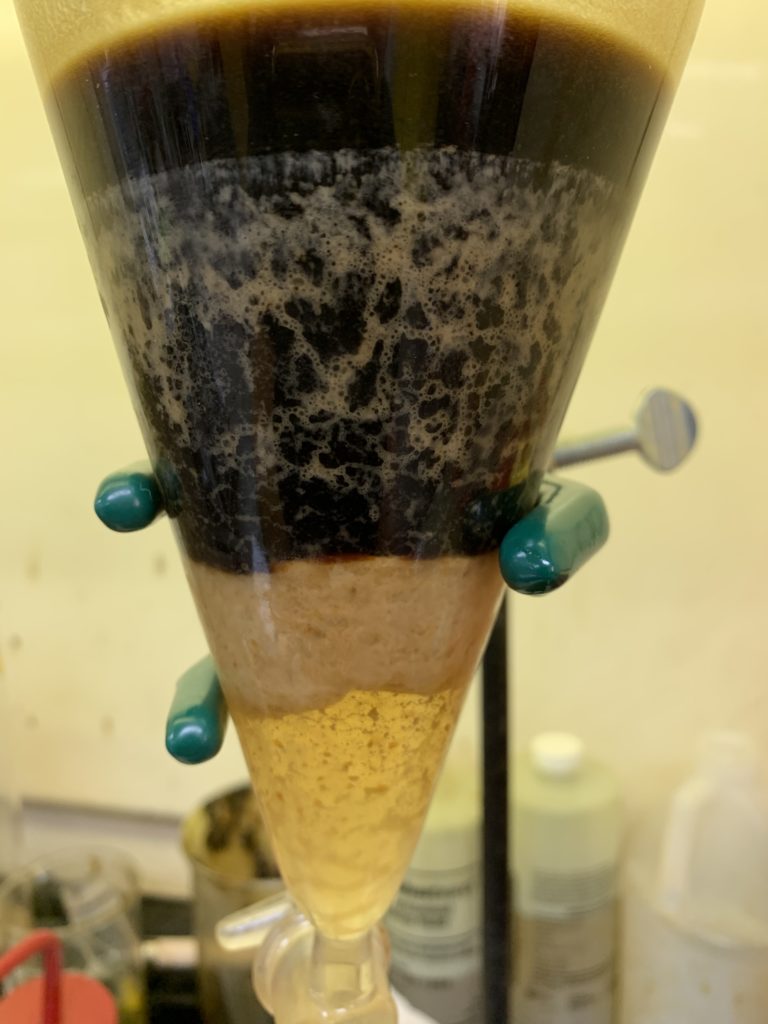Water-solubles in your distillate can gum up the works. Along with reducing your potency, they cause color in the final product and leave behind sludgy residue when distilling.
Most extractions bring some water-soluble components into the extract. These components come from the cells in the plant. Even butane or CO2 extractions can pull some.

A liquid-liquid extraction of water solubles from hemp extract.
With ethanol extractions in particular, these water-soluble compounds can make up quite a bit of the mix! Chlorophyll, sugars, and phospholipids all get pulled from the plant material along with the rest of the crude. The warmer the ethanol, the more water-solubles pulled.
We see even more water-solubles with ultrasonic extracts and screw press extractions. This is because the increased extraction efficiency comes from breaking open the cells and releasing many of these compounds.
Phospholipids make up many membranes in living organisms. They are tricky to remove because they are amphiphilic, meaning they like both water and non-polar solvents like hydrocarbons or even ethanol.
One solution is to extract the water-solubles after extraction and before distillation. Specially designed reactors can extract the water solubles. The oil is dissolved in a solvent and washed with water. Solubles are pulled out of the oil and into in the water. Once extraction is complete, the solvent can be rotovaped from the oil. Then it is ready for trouble free distillation.
February 22, 2021 at 8:41 pm
What type of solvent is used while washing with the water?
February 23, 2021 at 3:33 pm
The basic requirements are that:
1) The solvent is completely immiscible with water. This means most alcohols are off the table.
2) The solvent has a much greater affinity for cannabinoids than water does. Meaning that almost no THC/CBD can be found dissolved in the water layer. This also makes it so that many alcohols cannot be used as your cannabinoid fraction would be split between two solvents.
There are other factors like safety and health, ease of use, cost, and method of separating your solvent from your cannabinoids.
To answer your question, probably hexane.
August 22, 2021 at 3:10 am
Great information.
What is recommended for the temperature of the reaction, time and solution ratio of hexane, crude oil and water?
February 19, 2022 at 6:34 am
I mainly only do edibles now and don’t smoke or vape anymore, so I’ve been experimenting with different thc and cbd extraction methods. What I have found for myself is that oil extraction, or infusion into a good quality oil such as coconut oil, ghee, or olive oil will extract the fat soluble chemicals you want. After straining the plant material from the infused oil you can put it a pot of water on the stove and let the oil in the material move into the oil. Give it one final boiling and stirring of the plant material and then a final straining into the water in the pot will give you a very dirty tea with the water soluble chemicals in it with a layer of oil on top of the tea. When the tea cools a little put the pot in the fridge or freezer for half an hour or so and you can easily pull the solidified oil out of the pot leaving behind all the water soluble chemicals in the water. I read somewhere that typical cannabis has around 420 or more chemicals in it. I’ve thought about trying a dose of the tea, but I don’t really want to put so many chemicals in my body. I’m only interested in the two main chemicals that are fat or lipid based, so those are the ones to easily extract into oil. They reside only in the oil and the vast majority of the other 418 or so water soluble chemicals stay in the tea.
What I have found to be the best extraction method is to make cannabutter or coco-cannabutter infused oil for edibles (I use coconut oil mostly) getting the maximum thc and cbd extraction leaving the other 400 plus chemicals behind.
The other very nice thing about oil infusion method is that most of the nice terpines remain intact, so you get the nice aroma and flavor that you don’t get from alcohol extraction. Alcohol extraction seems to kill the terpines so you get a tar colored oil that has a terrible flavor and aroma. It’s nice to have mandarin kush or blue dream aroma and flavor in your coconut oil. Oil infusion method for extraction also has the advantage that you don’t have to worry about dangerous alcohol vapor. There are many videos on how to make cannabutter. Try it you won’t regret it.